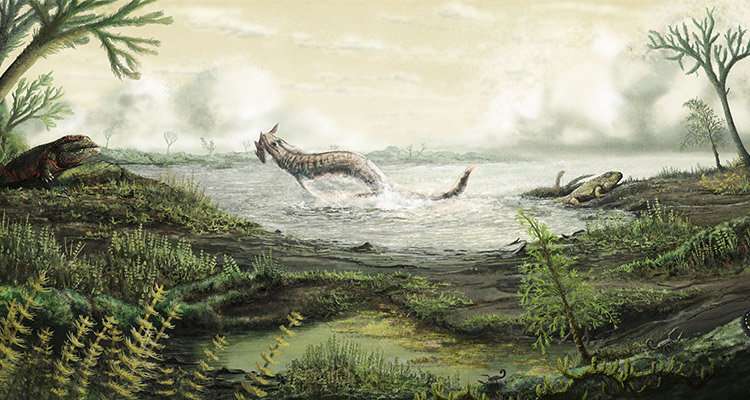Illustration of tetrapods on land. Credit: PlanetEarth Online
An ancient little lizard-like creature from the Scottish Borders is the missing ancestral link between human beings and the fish we evolved from millions of years ago.
Dubbed 'Tiny', its fossilised remains were found in in a piece of rock smaller than a clenched fist after people spotted a minute part of its skull sticking out.
360-345 million years ago, Scotland was a very different place. Lying close to the Equator, the vegetated land was hot, humid and subject to droughts and flooding. It was here that a major evolutionary event occurred: tetrapods (backboned animals with four limbs) invaded land.
These four-legged creatures are our ancestors.
But, for many years, scientists had no idea how this had happened. There was a 15 million year 'gap' in the fossil record—no four-legged fossils had been found dating from that time, so there was no evidence to show how this giant step had taken place.
That was until the late fossil hunter Stan Wood began excavations in the Borders that uncovered a haul of four-limbed creatures that help explain one of evolution's greatest mysteries.
There is still the bigger question of why creatures moved from water to land, but with every new find like Tiny, today's scientists get closer to answering that too.
Tiny was one of the first four-legged creatures on land, which makes it our ancestor. Credit: PlanetEarth Online
David Millward at NERC's British Geological Survey said:
Every specimen tells us something new. Tetrapods are our ancestors. They are the missing evolutionary link from fish and on to lizards, then ultimately to birds, dinosaurs, mammals and to us as people today. If tetrapods had not made that fundamental step we would not be where we are today.
David suggested one theory of why creatures moved to the land:
There were some very big, carnivorous fish in the lakes and creeks and no large predators on land so developing limbs to live on land would give any creature an advantage.
Credit: PlanetEarth Online
David is sure there are numerous other specimens worldwide, though the only other major site where tetrapods have been found to date is in Canada. Excitingly, unlike Scotland, they have also uncovered well-preserved footprints which are helping to create a better understanding of how these ancient animals moved on land.
"We haven't found good footprints here yet," Millward says, "but we're still looking."
Provided by PlanetEarth Online
























